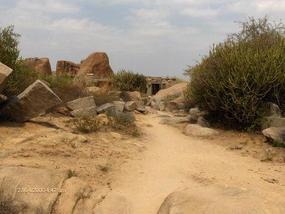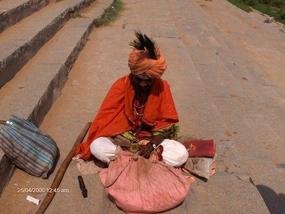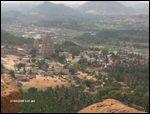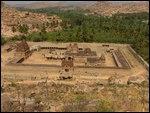Arriving in Hampi at sunset, through archways and ruins was an experience. So many ancient things tend to give one a sense of history, and one must crawl out of the Hanuman monkey mind and stop being wrapped up in personal strife to appreciate all that has come before.
It has been thought before, felt before, experienced before, by many
. Human nature has not changed for at least 40k years, and though we would like to consider ourselves somehow above the past, and more 'evolved' than the ancient peoples, the fact is that the human heart and brain has not changed a whit in all that time.
India is a prime example. These people are very intelligent and bright, super-clever. Most speak three languages: The "mother tongue," depending on the regional language, the "national" language, which is Hindi, and "international" speech, usually english. The children all speak these three, for the most part, which is more than I can say I have seen in the West, where people seem to be lazy when it comes to excercising the brain.
The Indian people make due with what they have, which in many cases is not much at all. They smile while they do it as well, and aspire to more, but do not push so hard as to the exclusion of family and humanity, as is so common in other countries. All in all, it is a culture of acceptance, and family and love is important here. Perhaps this is why I have become so comfortable here, my own country is full of closed-up and tight-assed people, though I have been lucky to have been surrounded by free thinkers for most of my life
.
"It is not what you have, it is who you have. . This is one of my own.
Enough perigrinating, and on to the show. . .
The first day in Hampi I basically spent having a lazy morning drinking coffee and reading the Vijay times, then I set to work on Rocinante in the heat of the day. I like to work or trek in the heat of the day, it gets one used to the blistering furnace that is the rocky world of Hampi, and indeed of Karnataka.
At the Gopi, I got to talking to my two new friends, Anil, and Kiran. They gave me the low down on some of the politics of the area. It seems that the Iron mining people, living in Hospet and wealthy, had started to put up a bridge over the river, and were told to take it down, as Hampi is a holy and historical site, and such a bridge would mean trucks all day and night bringing the iron ore that the greedy mining magnates so desparately want.
The second part of the plan was to move the main street, in which poor families and their shops reside to a plaza a couple of kilometers away to a half-finished plaza where they could ply their wares without bothering the high-income tourism they hope to draw by building five-star hotels along the riverside
. Of course, the same men want to do this all, and were handed a cease-and-desist order until the government minister of culture and history could have a look.
And look she did. A couple of days later she came into town with much fanfare and parading. Kiran, who is treasurer of the Hampi Colony Association had feared that she might be in the pocket of the big businessman, but after meeting with her, came away with a good impression, and said that she was thinking in "a right way."
So perhaps Hampi will live to see another year, another decade, perhaps.
This kind of development is typical of Indian politics. They want to put up a brand new bridge for trucks to pass over historic ruins, make a huge plaza to tuck away the poor merchants and take away their livlihood, build 5 star hotels on a historic site, yet the electricity does not stay on, the roads are shite, and there is no good water.
I have one word for the Indian government: INFRASTRUCTURE!
First one needs to wire the place, plumb it, have decent roads to get there, phones that work, etc, etc. Only then can one even think build resorts and such. A bit of the old "putting the cart before the horse" thing going on there.
Fortunately it would seem that the culture minister, all the way from Delhi was more sympathetic to the locals and their numerous petitions than to the interests of the big business.
These things work the same almost everywhere. Sometimes, though big business corporations are able to buy whole governments, even making wars, and taking freedoms.
This doesn't seem to have happened here in India, though there is still time.
Hampi part 1
Tuesday, April 25, 2006
 Hampi, India
Hampi, India
Other Entries
-
14Rocinante! The Harley of India. . .
Mar 1640 days prior Arambol, Indiaphoto_camera5videocam 0comment 0
Arambol, Indiaphoto_camera5videocam 0comment 0 -
15Booze and drugs and rock and roll.
Mar 2630 days prior Goa, Indiaphoto_camera5videocam 0comment 1
Goa, Indiaphoto_camera5videocam 0comment 1 -
16Mapusa. . .
Mar 3026 days prior Mapusa, Goa, Indiaphoto_camera5videocam 0comment 0
Mapusa, Goa, Indiaphoto_camera5videocam 0comment 0 -
17The dark side of Paradise. .
Mar 3125 days prior Arambol, Goa, Indiaphoto_camera3videocam 0comment 0
Arambol, Goa, Indiaphoto_camera3videocam 0comment 0 -
18Language theory, and so many choices.
Apr 0223 days prior Arambol, Indiaphoto_camera2videocam 0comment 0
Arambol, Indiaphoto_camera2videocam 0comment 0 -
19Dead and rotting things on the beach.
Apr 0322 days prior Arambol, Goa, Indiaphoto_camera3videocam 0comment 0
Arambol, Goa, Indiaphoto_camera3videocam 0comment 0 -
20Rocinante gets to gallop
Apr 0619 days prior Palolem, Indiaphoto_camera5videocam 0comment 0
Palolem, Indiaphoto_camera5videocam 0comment 0 -
21Itchy feet and fading smiles.
Apr 0916 days prior Palolem Beach, Indiaphoto_camera5videocam 0comment 0
Palolem Beach, Indiaphoto_camera5videocam 0comment 0 -
22Scams advice, and "The Crew". .
Apr 1312 days prior Palolem Beach, Indiaphoto_camera5videocam 0comment 1
Palolem Beach, Indiaphoto_camera5videocam 0comment 1 -
23The time machine, The Darkness and The Light. .
Apr 187 days prior Palolem beach, Indiaphoto_camera5videocam 0comment 0
Palolem beach, Indiaphoto_camera5videocam 0comment 0 -
24Going Native
Apr 214 days prior Still in Palolem, Indiaphoto_camera5videocam 0comment 0
Still in Palolem, Indiaphoto_camera5videocam 0comment 0 -
25Leaving Palolem. .
Apr 223 days prior Palolem, Indiaphoto_camera5videocam 0comment 0
Palolem, Indiaphoto_camera5videocam 0comment 0 -
26Hard Core Karnataka: part 1
Apr 232 days prior Yaragatti, Karnataka, Indiaphoto_camera2videocam 0comment 0
Yaragatti, Karnataka, Indiaphoto_camera2videocam 0comment 0 -
27Hard Core Karnataka: part 2
Apr 232 days prior Yaragatti, Karnataka, Indiaphoto_camera4videocam 0comment 0
Yaragatti, Karnataka, Indiaphoto_camera4videocam 0comment 0 -
28Hard Core Karnataka: part 3
Apr 232 days prior Yaragatti, Karnataka, Indiaphoto_camera5videocam 0comment 0
Yaragatti, Karnataka, Indiaphoto_camera5videocam 0comment 0 -
29The long road to Hampi: Part 1
Apr 241 day prior Hampi, Karnataka, Indiaphoto_camera5videocam 0comment 0
Hampi, Karnataka, Indiaphoto_camera5videocam 0comment 0 -
30The long road to Hampi: part 2
Apr 241 day prior Hampi, Karnataka, Indiaphoto_camera5videocam 0comment 0
Hampi, Karnataka, Indiaphoto_camera5videocam 0comment 0 -
31Hampi part 1
Apr 25 Hampi, Indiaphoto_camera5videocam 0comment 0
Hampi, Indiaphoto_camera5videocam 0comment 0 -
32Hampi part 2, Hampi Magic
Apr 25later that day Hampi, Karnataka, Indiaphoto_camera5videocam 0comment 0
Hampi, Karnataka, Indiaphoto_camera5videocam 0comment 0 -
33Hampi part 3, caves and musical stones
Apr 25later that day Hampi, Indiaphoto_camera5videocam 0comment 0
Hampi, Indiaphoto_camera5videocam 0comment 0 -
34Hampi part 4, temples and coracles
Apr 261 day later Hampi, Indiaphoto_camera5videocam 0comment 0
Hampi, Indiaphoto_camera5videocam 0comment 0 -
35Hampi part 5, Hanuman, the monkey king.
Apr 272 days later Hampi, Karnataka, Indiaphoto_camera5videocam 0comment 0
Hampi, Karnataka, Indiaphoto_camera5videocam 0comment 0 -
36Hampi part 6, Kiran and the plantation
Apr 283 days later Hampi, Indiaphoto_camera5videocam 0comment 0
Hampi, Indiaphoto_camera5videocam 0comment 0 -
37The way to Mysore. .
May 016 days later Mysore, Indiaphoto_camera5videocam 0comment 0
Mysore, Indiaphoto_camera5videocam 0comment 0 -
38Mysore.
May 027 days later Mysore, Indiaphoto_camera5videocam 0comment 0
Mysore, Indiaphoto_camera5videocam 0comment 0 -
39Oooty and beyond.
May 0510 days later Ooty, Tamil Nadu, Indiaphoto_camera5videocam 0comment 0
Ooty, Tamil Nadu, Indiaphoto_camera5videocam 0comment 0 -
40Much ado about Mirayoor.
May 0611 days later Mirayoor, Kerala, Indiaphoto_camera5videocam 0comment 0
Mirayoor, Kerala, Indiaphoto_camera5videocam 0comment 0 -
41Mirayoor, and John.
May 0712 days later Mirayoor., Indiaphoto_camera5videocam 0comment 0
Mirayoor., Indiaphoto_camera5videocam 0comment 0 -
42Waterfalls and Tea plantations.
May 0813 days later Mirayoor, Indiaphoto_camera5videocam 0comment 0
Mirayoor, Indiaphoto_camera5videocam 0comment 0 -
43Munnar at last! And, the elusive Eugene. .
May 0813 days later Munnar, Kerala, Indiaphoto_camera5videocam 0comment 2
Munnar, Kerala, Indiaphoto_camera5videocam 0comment 2 -
44Another beach town. . .
May 1015 days later Varkalla, India, Indiaphoto_camera5videocam 0comment 0
Varkalla, India, Indiaphoto_camera5videocam 0comment 0 -
45The Misty mountain Hop. .
May 1520 days later Munnar/Marayoor, and beyond. ., Indiaphoto_camera5videocam 0comment 0
Munnar/Marayoor, and beyond. ., Indiaphoto_camera5videocam 0comment 0 -
46Mysore again. .
May 1823 days later Mysore, Indiaphoto_camera5videocam 0comment 0
Mysore, Indiaphoto_camera5videocam 0comment 0 -
47Three days in an Indian prison cell. . . .
May 1924 days later Mysore, Indiaphoto_camera5videocam 0comment 0
Mysore, Indiaphoto_camera5videocam 0comment 0 -
48Bangalore Bangs!
May 2227 days later Bangalore, Indiaphoto_camera5videocam 0comment 0
Bangalore, Indiaphoto_camera5videocam 0comment 0 -
49Kottakota 460 km in one day.
May 2429 days later Kottakota, Indiaphoto_camera6videocam 0comment 0
Kottakota, Indiaphoto_camera6videocam 0comment 0

 Hampi, India
Hampi, India





2025-05-22